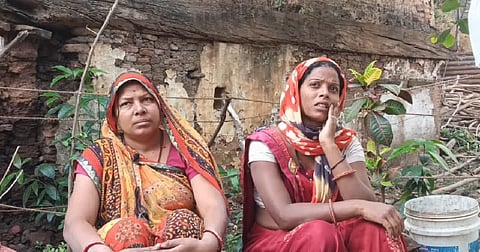
Banswara, Rajasthan- Enduring six hours of labor, sweeping streets and clearing drains, the searing afternoon sun adds aches to the back and a relentless thirst to the parched throat. Imagine approaching any door, seeking respite with a plea for drinking water, only to be handed water not a tumbler or glass, but a bathing mug.
Casteism runs deep in Kushalgarh, the largest municipal area in Banswara district. Despite claims of tolerance, the sanitation workers from the Dalit community remain untouchable and subject to discriminatory treatment. Their entry beyond house thresholds is denied, and even those associating with Dalits face contempt. This discrimination is not limited to the Brahmin class; individuals from all religions, communities, and societies, including the tribal community, contribute to the demeaning treatment of the Dalit community in this small town.
In an effort to understand the challenges faced by Bahujan communities in rural areas, The Mooknayak spoke to residents of Kushalgarh Municipality. Initial conversations were with sanitation workers like Kalpana, who has worked on a temporary basis for 6-7 years. Kalpana highlights the unjust mentality towards them, considering them "trash" due to their small and low caste. Her husband's seasonal work as a bhajan singer adds financial instability.
Kalpana describes the struggles of providing for her family, including two children and her mother-in-law. A meagre monthly salary of Rs 6,300 from the municipality, the irregularity of payments poses significant challenges. Payments vary between the 10th and 20th of the month, and at times, they are delayed for even two months. Working under a contractor adds to the confusion, as the exact salary, rumoured to be Rs 8,000, remains unclear. Salary payments are made through cheques, with the municipality paying the contractor, who subsequently pays the cleaning workers.
These sanitation workers endure more than just financial hardships. They face societal bias, including being given water in bathroom mugs and enduring derogatory perceptions.
Like Kalpana, approximately 20 more female sanitation workers are employed on a temporary basis. A few years ago, permanent recruitment forms were released, but the process stalled due to disputes. In Kushalgarh city, comprising 15-20 localities with colonies representing various communities, these workers face discrimination while performing their duties. Kalpana's colleague, Shilpa, shares the challenges with The Mooknayak.
Shilpa reveals that she and her fellow workers endure daily insults. If they are spotted by an upper-caste individual wielding a broom in the morning, it sparks uproar in the market. People demand they start cleaning at 5 am, questioning their delayed arrival when the designated working hours are 6-9 am and 2-5 pm. To avoid conflicts, sanitation workers silently tolerate inconveniences like parking garbage carts at a distance. Even when returning empty garbage buckets, the workers wash them before taking them inside their houses.
Shilpa recounts additional humiliations during special festivals or celebrations. " They push the eatables or packets towards us, they do not give things in our hands. If we happen to accidently touch them, they yell at us as if we are not human beings" Shilpa said. Furthermore, when offered tea by some families, the sanitation workers are asked to bring their own cup. In instances where tea is served in the family's cup, they are instructed to keep the cup in their own vehicle, clearly stating that the Dalit workers cannot expect to receive equal treatment like others.
Kalpana and Shilpa express, "Our salary is very low, and the government should consider how we can survive on Rs 6,000 in today's time. Those with permanent jobs receive salaries of forty thousand or even more, but due to our low salary, it doesn't come on time. We have to borrow, with Rs 100 interest charged on every thousand rupees. We repay the loan when we get our salary and then take another loan to meet household expenses - this cycle continues."
The Mooknayak interviewed senior citizen Ashok Pandya, who retired as a sanitation inspector from the municipality in 2016. He shared that before retirement, he made permanent recruitments at his own risk, but since then, no permanent appointments have been made to these posts. Pandya's wife, Jyotsna, currently serves as a ward councillor.
When questioned about discrimination, Jyotsna stated that there is no caste issue in the town. Regarding the major problems in the city, she mentioned that due to the BJP board, there has been a lack of support and assistance from the state government for the last four years. Municipal Board meetings have not been convened in the last five-six months, resulting in a lack of major progress. Cleanliness, encroachment, and sewerage line issues are predominant in the town.
Kushalgarh was established as a chiefship by the British government. Social science expert Dr. Nidhi Seth explains that before 1949, it was a princely state established as a chiefship by English rule in 1866. The British played a crucial role in setting up local administration in Kushalgarh, with the municipality established in the first decade of the 20th century. In a letter from 1912, residents of Kushalgarh addressed the manager of the Chiefship, outlining their demands for desired facilities in the city.
Documents reveal that the municipality faced a financial crisis during 1912-1913, leading the British to strongly suggest its closure. The annual income at that time was Rs 127 0.1 anna. This period coincided with the First World War, imposing consequences on Britain's colonial states and their people. The report for the Administration of Kushalgarh Chiefship in the year 1914-15 indicates that the burden of the war was placed on the residents. However, diligent workers of the local self-government prevented the municipality from suffering losses.
Also Read-
You can also join our WhatsApp group to get premium and selected news of The Mooknayak on WhatsApp. Click here to join the WhatsApp group.